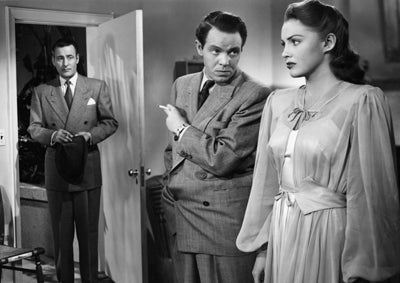Directed by Alfred Werker
Following in the footsteps of her studio colleagues (Bette Davis, James Cagney, etc.), Warner Bros.’ girl-next-door Joan Leslie sued the studio in court because of the undesirable roles she was being assigned. Leslie won the court battle in 1946, but Jack Warner made certain she was persona non grata at the other major studios. Worried that she may never work again, Leslie signed a two-picture deal with Eagle-Lion Films in 1947. Her first film for the poverty row studio was a noir drama with a time-travel twist titled Repeat Performance; it would be the studio’s biggest budgeted feature to date.
Leslie plays glamorous Broadway actress Sheila Page, who at the very start of the film, rings in the New Year by killing her alcoholic husband (Louis Hayward). Our heroine immediately confesses the crime to her producer and friend John Friday, and wishes she had the entire year to live over again in order to correct the chain of events. In a twist worthy of The Twilight Zone, her wish comes true—although the screenplay adaptation by Walter Bullock of the William O’Farrell novel does not spend any time defending this outrageous turn of events. The audience gets to enjoy the now very adult Leslie utilize all of her alluring feminine machinations to keep history from turning into another “repeat performance.”
The film’s cast includes a wide variety of highly talented yet atypical supporting players. A dashing and earnest Richard Basehart turns his film debut as poet William Williams into one of the film’s most memorable performances. Vivacious Broadway musical star Benay Venuta makes her feature debut in this noir drama as wise-cracking Bess Michaels (Venuta was the popular replacement for Ethel Merman in Cole Porter’s Anything Goes). Tom Conway delivers a crisp performance as John Friday (Conway is best remembered today for successfully replacing his brother George Sanders in the “Falcon” mystery series). Virginia Field and Natalie Schafer round off the terrific supporting cast with sophisticated cattiness appropriate to Bullock’s crackling dialogue.
Film Noir Foundation Founder and President Eddie Muller has stated that “this fantasy-noir hybrid, with all of its back-stabbing backstage melodrama, is basically the film noir version of It’s a Wonderful Life. Although The New York Times dismissed the film as “dramatic hocus-pocus” that would “drive a small segment of the public completely and irrevocably mad,” Variety praised the handsome production as being “well-paced and well-acted.”
Todd Wiener
Eagle-Lion Films, Inc. – A Bryan Foy Production. Producer: Aubrey Schenck. Based on the novel by William O'Farrell. Screenwriter: Walter Bullock. Cinematographer: Lew W. O’Connell. Editor: Louis H. Sackin. With: Louis Hayward, Joan Leslie, Virginia Field, Tom Conway, Richard Basehart.
35mm, b/w, 91 min.
Preserved from a 35mm nitrate composite fine grain master. Laboratory services by The Stanford Theatre Film Laboratory, Audio Mechanics, DJ Audio, Simon Daniel Sound. Special thanks to Alexander Kogan.







